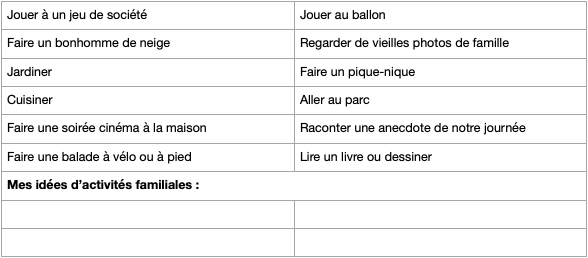My child’s needs
My child’s basic needs
As a parent, you have many roles to play in meeting your child’s needs and ensuring their proper development. Your child has many basic needs, such as playing, being listened to, being able to make choices, receiving help, resting, receiving hugs and many others.
“Imagine that your child has a bowl that must always be filled with affection, love, security and attention. Some children seem to always have a full bowl because they have the ability to refill it themselves when it becomes empty. But most children tend to get nervous and feel helpless as it empties. A child who notices that their bowl is empty may react in a number of ways. They may cry, sulk, become impatient or throw a tantrum to get their parents’ attention. Unmet needs may cause a child to find other ways to meet them, such as engaging in disruptive behaviours.
But what causes a child’s bowl to become empty? Stress, tension, rejection, loneliness, yelling and punishment, failure, fatigue or doing things they dislike. And what fills a child’s bowl? Play, friendship, love and affection, attention, success, doing things they like, clear rules and encouragement. When a child’s bowl is full and their needs are met, it promotes mental health and development.
As a parent, it is important to remain patient when helping your child fill their bowl, especially during difficult times.”
The importance of the parent-child relationship
Along with a child’s other basic needs, the need to form strong bonds with loving and available adults is fundamental. The parent-child relationship is important to a child’s development and the family’s well-being.
- A loving, predictable, structured and safe environment for your child is one of the basic factors that helps them achieve positive growth in harmony with their surroundings.
- A strong, positive relationship between you and your child, even when one parent is having a difficult time, promotes optimal development and reduces the risk of your child developing a mental health problem.
- This type of environment is important for a child’s well-being, especially in families where one parent is living with a mental illness.
All of the ways you maintain a loving relationship with your child, such as giving affection, listening to your child or doing fun activities together, help to better your child’s mental health.
Meeting my child’s emotional needs
The need to feel unconditionally appreciated and loved is another of your child’s basic needs. It’s essential to find ways to maintain a sense of closeness and connection with your child, even when you’re not feeling well. There are many ways to give your child affection and show them that you love them and that they are important and special to you. Take a few minutes to think about the ways you already show your child that you love them and what other ideas you would like to try.
……………………………………………………………………………………………………………………………………………………………………………………………………………………………………………………………………………………………………………………………………………………………………………………………………………………………………………………………………………………………………………………………………………………………………………………………………………………………………………………………………………………………………………………………………………………………………..
The habits you adopt on a daily basis allow your child to feel loved and appreciated. The affection you show your child makes them feel strong and happy, which is good for their emotional development.
- Listen to your child when they want to talk about something they’re interested in or show you something they’ve made
- Play with your child for a few minutes (e.g., before starting their bedtime routine)
- Watch your child play and ask them to talk to you about what they are doing
- Be sensitive to how you respond to your child when they make a request you cannot agree to
- Give your child a hug or kiss, play with their hair or tickle them
- Thank your child when they do something to help out
- Encourage your child, point out their strengths or describe what makes you proud of them
- Put a kind note (e.g., I love you!) in your child’s lunchbox or on their spot at the table
Spending quality time together
The need to play and spend quality time with close family and friends is also essential for a child. When a family goes through difficult times, it may be hard to spend positive time together each week. In a crisis situation, a parent living with a mental illness may have difficulty making and spending quality time with their child or enjoying the interactions they have with them. However, even through periods of crisis (during which there is often more arguing, crying, stress and distance, for example), it is suggested that you set aside time for fun and affection with your child. These opportunities allow you to develop a positive and close parent-child relationship and promote family cohesion.
Family activities don’t have to be long, expensive or complex; the quality of time spent together is more important than the quantity.
For example, it is more important for a child to receive positive attention from their parent on a daily basis than it is to spend long periods of time with a parent every now and then.
It can be helpful to plan these times in advance if you know you don’t have much energy or time. Alternatively, if you don’t feel up to doing an activity with your child, you could try to find other ways to spend time together, such as watching them play or listening to music with them.
Here are some examples of fun activities you can do as a family. You can reflect on the opportunities you have each day to connect with your child and have fun as a family.
List of family activities

Sometimes it’s hard to meet my child’s basic needs!
Your child may not always express their needs clearly. For example, some children may express their need for attention or love by screaming, throwing a tantrum or misbehaving. Others may always ask for new toys, when what they really need is for their parent to take time to play with them. It can be helpful to be able to decode their needs but also to help your child verbalize and communicate their needs to others. Some ways to do this include asking your child about their needs, discussing what you think their needs are based on their behaviour, leading by example by communicating your own needs, using a poster or needs cards to help your child talk about their needs or having your child draw a picture of their needs.
It is important to strike a balance in meeting your child’s needs. There may be times when, for a variety of reasons (e.g., your child’s needs have changed, they have gotten older, your availability has changed or you are under a lot of stress) your child may not feel that their needs are being met well enough. Try to listen to your child, be available to hear or notice what is wrong with them and adapt how you respond to their needs, if necessary.
On the other hand, there may be times when it is difficult or even impossible for a parent living with a mental illness to provide care to their child, meet their basic needs, show them love or spend quality time with them. The symptoms of the mental illness can sometimes take over and prevent you from acting as you normally would. In this case, seeking support from someone close to the family, such as a friend, relative or professional, may be a good option. Your child will feel less alone, be able to talk to this other adult about what they are experiencing at home and perhaps ask for advice.
Several resources are available to you. Feel free to check them out here or by calling 211 (https://www.211qc.ca).
A big thank you to Stephanie and Adela, parent members of the LaPProche advisory committee, for their collaboration and involvement in the designing of this fact sheet.
This content was developed at the Université du Québec en Outaouais by the Research and action laboratory for people with mental health problems and their loved ones (LaPProche) with funding from the Fonds des services aux collectivités (FSC2018-013) of the Ministère de l’Enseignement Supérieur and in collaboration with CAP santé mentale.
The information contained in this sheet does not replace seeking professional advice. If you have any questions or concerns, please see a professional.
References
Beardslee, W.R., Martin, J., & Gladstone, T. (2012) Family Talk preventive intervention manual. Boston Children’s hospital: FAMPOD. https://fampod.org/
Ferland, F. (2014). Le développement de l’enfant au quotidien de 6 à 12 ans. Éditions CHU Sainte Justine.
Piché, G., Villatte, A., & Habib, R. (2019). Programme FAMILLE+. Manuel du parent [document inédit]. Université du Québec en Outaouais : Laboratoire de recherche et d’actions pour les personnes ayant des problèmes de santé mentale et leurs proches (LaPProche).
Piché, G., Villatte, A., Habib, R., & Vetri, K. (2019). Programme FAMILLE+. Manuel de l’enfant [document inédit]. Université du Québec en Outaouais : Laboratoire de recherche et d’actions pour les personnes ayant des problèmes de santé mentale et leurs proches (LaPProche).
Solantaus, T., & Ringbom, A. (2002). How Can I Help My Childrend : A Guide Book for Parents With Mental Health Problems.
To cite this document, please provide the following reference: LaPProche Laboratory. (2021). Parents living with a mental illness: My child’s needs. Université du Québec en Outaouais.
© LaPProche 2021| lapproche.uqo.ca
All rights reserved.
Any reproduction in whole or in part by any means whatsoever is prohibited without the written permission of LaPProche.
































